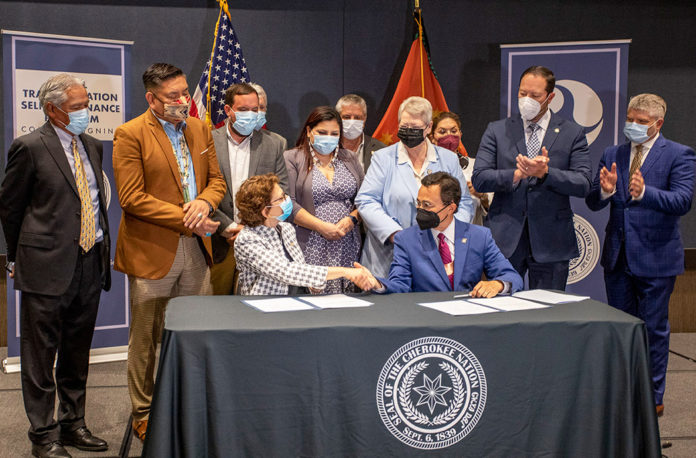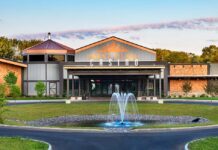
TAHLEQUAH, OK – The Cherokee Nation welcomed its first visit from U.S. Deputy Secretary of Transportation Polly Trottenberg, the nation’s second highest ranking transportation official.
Deputy Secretary Trottenberg and Cherokee Nation Principal Chief Chuck Hoskin Jr., signed a Tribal Transportation Self-Governance Program compact and funding agreement, the first of its kind between a tribe and the U.S. Department of Transportation (USDOT). Secretary Buttigieg, who could not attend the event due to testing positive for COVID 19, signed the compact from Washington D.C. and Deputy Secretary Trottenberg signed during the event as a witness.
Since 2021, the USDOT has engaged with the Cherokee Nation in the negotiation of a compact and funding agreement under the Tribal Transportation Self-Governance Program in support of the Cherokee Nation’s right to self-determination and self-governance. The approval gives the tribe the ability to plan and oversee its own road construction planning and transit projects without having to seek federal permission and oversight over projects.
“We are honored to have U.S. Deputy Transportation Secretary Trottenberg visit the Cherokee Nation, which has led a sophisticated transportation program for several years helping our tribal communities, state and federal partners with safer, well-maintained roadways in the reservation,” said Cherokee Nation Principal Chief Chuck Hoskin Jr. “Having oversight for the first time to plan, lead and oversee the finance of our own road projects will only mean more and better investments in terms of travel and infrastructure in the Cherokee Nation to the benefit of thousands of citizens.”
Deputy Secretary Trottenberg visited the Cherokee Nation Rocky Top Road project near Fort Gibson and discussed EV initiatives undertaken by the tribe.
“We are proud to stand today with the Cherokee Nation to announce this first of its kind Self-Governance Compact that gives the tribe much-deserved decision-making authority and flexibility over federal funds for transportation projects,” said Deputy Secretary Trottenberg. “The Biden-Harris Administration and our Department are firmly committed to honoring tribal sovereignty and codifying tribes’ right to self-determination through agreements like this one.”
The Cherokee Nation built one of the first solar canopies in Oklahoma at its headquarters in Tahlequah, OK. The structure is used to charge Cherokee Nation’s electric fleet vehicles and the rising number of electric cars driven by staff and visitors to its tribal complex.
The tribe has two electric transit buses and new charging stations built to accommodate the vehicles which were purchased through a $1.5 million USDOT grant awarded to the tribe in 2018, as part of Cherokee Nation’s ongoing effort to reduce its carbon footprint. It also has an electric school bus.
The Cherokee Nation Transportation and Infrastructure Department invested $12.1 million and improved 67 miles of roadway in fiscal year 2020, $19.2 million invested and 88 miles of roadway improved in Fiscal Year 2021 and $10.3 million invested and 50 miles of roadway improved so far in Fiscal Year 2022. The department also provided more than 95,000 transit rides so far, this year.














































